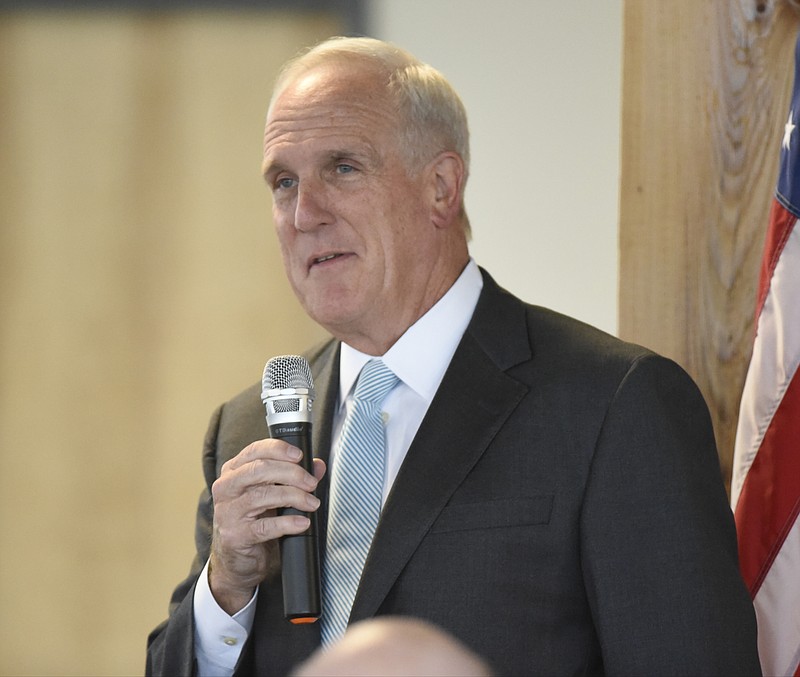NASHVILLE - Tennessee Attorney General Herbert Slatery says a federal lawsuit settlement announced Monday by two Ohio counties with opioid drug makers and distributors "is an important step" in moving toward a 50-state "global" agreement with states totaling $48 billion.
Slatery, who joined with state attorneys general from North Carolina and Pennsylvania in a national telephone conference call, said it would "ensure people struggling with opioid addiction across the country get the help they need as soon as possible."
A comprehensive resolution "on the table," the Republican argued, "will distribute funds fairly between states, counties and cities while also ensuring that these companies change their business practices to prevent a public health crisis like this from ever happening again."
His comments came as two Ohio counties settled a federal lawsuit against four drug companies earlier in the day for $260 million.
But efforts by Slatery and other state attorneys general are getting pushback from Tennessee local district attorneys who are among 14 DAs representing nearly half the state's counties who have their own pending lawsuits against narcotic painkiller manufacturers and distributors in state courts. The DAs have already crossed swords with Slatery over his previous efforts to get their litigation halted.
"It's disappointing to see that a few state officials are more interested in settling with these defendants than in reaching a settlement that will save lives," said District Attorney General Bryant Dunaway of the 13th Judicial District, which includes Putnam County on the Cumberland Plateau.
In his statement, Dunaway also said "numerous" counties and communities "were suffering from this crisis and struggling to discover a legal solution long before it became apparent that there would ever be any financial relief. Now that there are settlement funds being discussed, there are representatives who seem eager to settle for far, far less than anything representing meaningful relief."
The deal state attorneys general "are rushing to accept," Dunaway said, "would parse out $18 billion over 18 years, nationally. When broken down to the city/county level on an annual basis, this amount does nothing to alleviate the very serious issues these companies have created in Tennessee.
"It is, at best, a budget for more body bags," warned Dunaway, noting drug manufacturers and distributors named in Tennessee DAs' complaints "are among the largest in the nation and the world. They have profited for decades off the suffering of rural Americans, particularly in Tennessee, and we are not willing to accept pennies on the dollar for the losses we have incurred as a result of their actions."
His statement had the support of District Attorney Jared Effler in the 8th Judicial District, which includes Fentress and Scott counties, and District Attorney Barry Staubus in Sullivan County.
During Monday's conference call, Slatery and North Carolina Attorney General Josh Stein said the states' approach "will provide significant sums that will provide help to people in our states." That includes free narcotic treatment drugs such as Suboxone, he said.
The total value of the proposal, which has been pushed by drug companies and distributors, is $48 billion. Stein said $22 billion of that is cash which would be distributed among states and localities. There's also $23 billion in the form of free treatment such as Suboxone and about $3 billion in free-of-charge distribution by distributors.
Pennsylvania Attorney General Josh Shapiro said state attorneys general "agree getting resources to these hard-hit communities is critical." But with some 3,000 lawsuits filed against the opioid industry, he argued, relief "will be random, it will be haphazard, it will take decades" and "lead to dissolution and likely the bankruptcy of these companies."
Not all states have signed on to the global settlement efforts.
Slatery said part of the plan by states which are involved is a set of "injunctive terms" that would provide states with far more information about what is going on.
"Part of the problem is that we haven't known what has been going on regarding the supply chain, specific orders, suspicious reports have not been made," Slatery said. "And so this set of injunctive terms basically outlines this is what you must do and this is separate from what we want them to pay."
Slatery called it an "a multi-phased document to change practices." Each company would be required to have a "compliance officer" who oversees approvals of new customers and sets and revises thresholds on narcotic painkiller purchases.
Moreover, there would be a "clearing house" where purchase data would be logged so everyone knows "what drugs are being supplied, to whom and where and what times," Slatery said.
Asked by the Times Free Press why the public should have confidence about injunctive powers given that a 2007 agreement struck by then-Tennessee Attorney General Robert Cooper with opioid manufacturer Purdue Pharma was apparently never utilized either by Cooper or Slatery, who succeeded him seven years later, Slatery said, "I think the problem with it is that they are, we're trying to get [it] up and enforced at this point. That's why we filed an action against Purdue."
But Slatery said "hopefully" in a national settlement there'll be a large number of states and "a lot more public scrutiny of these terms.
"And," he added, "you've got a compliance officer that's going to be reporting and a clearing house set. There's a lot more structure to it. There'll be a lot more information. And frankly, because of the problem, it'll be followed a lot more closely."
Contact Andy Sher at asher@timesfreepress.com or 615-255-0550. Follow on Twitter @AndySher1.
